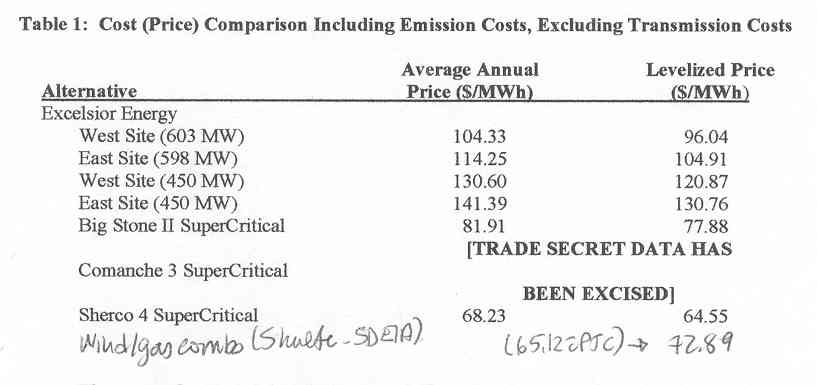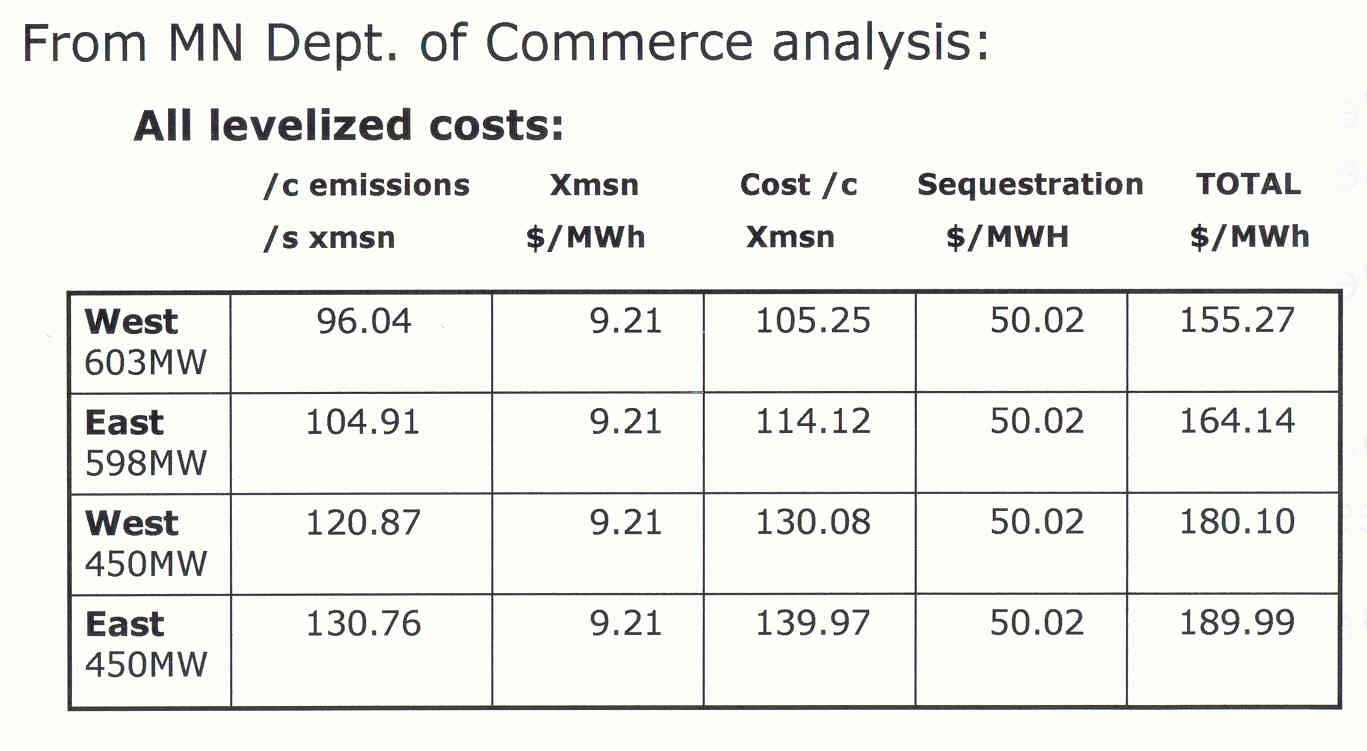NRG’s Motion for TRO tossed out!
March 28th, 2007

EEEEEEEEEE-HA!!! NRG got told what they can do with their attempt at secrecy. They wanted to keep their emissions info secret… HUH??? How would their info be any different than Mesaba? And if they’re wanting to keep it secret, how could that mean anything but that their emissions profile is worse than Mesaba’s? Here’s the Mesaba Info:
But what yesterday’s hearing and PSC record thus far reveal is that:
1) It appears that NRG’s technology vendor, is likely to be Mitsubishi Heavy Industries (MHI), referred to as “a Japanese technical provider.” MHI lacks a demonstrated IGCC technology at this point. Their first gasifier runs are scheduled for the second half of 2007, per their website. Therefore, MHI has no emissions data.
2) NRG expressly stated that there is no technology vendor contract at this point, they are “contracting” but have not “contracted,” and again, therefore, they have NO emissions data.
3) The focus of NRG’s motion was to protect THEIR contracting ability with potential vendors, not a competitive issue with other utilities.
4) No confidentiality agreement, no contractual obligation, therefore information will be released.
And here’s Gas Turbine World on the Mitsubishi IGCC technology — thanks to Harry Jaeger for insight into their development timeline:
Japan 250MW coal based IGCC demo plant set for 2007 start up
Here’s the poop from the News Journal:
NRG loses bid to keep emissions secret
Delaware court clears the way for information on new plant
By JEFF MONTGOMERY, The News Journal
Posted Wednesday, March 28, 2007Chancery Court on Tuesday refused to block the release of more details about NRG Energy Inc.’s more than $1.5 billion plan for a new power plant near Millsboro.
NRG sought a temporary restraining order last week, after the Public Service Commission voted to make public bid information the company had declared confidential. Company officials said the release could “irreparably harm” NRG, giving competitors insights into the company’s business strategies and damaging NRG efforts elsewhere.
But Chancellor William B. Chandler III ruled, after more than an hour of testimony in Georgetown, that NRG had failed to prove the PSC acted arbitrarily with its order — issued in connection with a Freedom of Information Act request from The News Journal.
“It’s obvious to me that the commission made its decision in an informed and deliberate manner,” Chandler said.
The ruling will allow the PSC to release the information today.
James M. Geddes, staff counsel to the commission, said the public had “clamored” for release of more information from NRG’s proposal, particularly details about emissions.
“There are members of the public who want this type of information so they can file written information that can assist the decision-makers,” Geddes said.
Caroline Angoorly, NRG northeast vice president, said the company would continue to seek state backing for a contract to build the plant and sell most of the electricity to Delmarva Power.
“We have a good project. We are nondeterred,” Angoorly said. “We think it’s part of the solution for Delaware.”
Chandler cautioned that his decision was based on the court’s right to consider fairness and equity claims, rather than on Freedom of Information Act terms. He also said that NRG had no right to challenge the PSC’s action under state administrative rules because the agency’s decision on which company would be chosen to provide the state with energy has yet to be made.
The PSC and three other state agencies have been wrestling for months with bids for a new Delmarva Power generating contract. State lawmakers ordered the company to seek new in-state electricity supplies last year, after the long-delayed effects of utility deregulation pushed customer bills sharply higher.
Dogging the process have been complaints about bidder “blackouts” that prevented the public from seeing details about potential rate-payer impacts, project costs, likely pollution emissions and other details.
In a separate ruling, Chandler agreed to temporarily block release of information from Bluewater’s bid involving wind-turbine manufacturer Vestas Offshore .
Bluewater signed a nondisclosure agreement with Vestas, but failed to notify the PSC.
Contact Jeff Montgomery 678-4277 or jmontgomery@delawareonline.com.
So, once more with feeling — will someone explain to me why the cost information is not at issue? Why the cost of the NRG proposal is not public? Nearly all of the cost information for Excelsior Energy’s Mesaba Project is public in Minnesota! That information has been provided to the Delaware PSC!


Green Delaware had a representative at the hearing who sent the following (lightly edited) comments:
Carol Dobson’s notes from Chancery Court’s hearing the case brought by NRG against the PSC to block the release of more details about their energy bid.
Georgetown, DE
March 27, 2007.2:00pm -2:35pm NRG Lawyer, Mr. Scaggs, presenting case before Chancellor William B. Chandler, III ( JUDGE): Do the RFP instructions include that bidders can withdraw?
Now that the information is with the PSC, if a party walks away, what happens to that information?NRG: The PSC should have determined if the information was G2. They didn’t. They claim public interest.
JUDGE: Hearing the records indicate a balance of testimony.
NRG: If the PSC determination stands, there is a concrete threat of TRO.
Instructions to bidders was that information would be treated confidentially except what is authorized by law.JUDGE: There are two judicial remedies before me:
1. A first for the State of Delaware: Any citizen can challenge this action, a reference to open
meetings.
2. If you look at case law, a claim under FOIA, and exception that applies by PSC with Chrysler
Corporation. Non-public information should not be released except as required by law.NRG: G2 is further defined in a National Parks case. (The NRG lawyer then provided the Judge with an Issues Sheet prepared by PSC staff on 3/7/07.) They send the message that confidential information would be respected as such. This led NRG to provide a very detailed proposal and now we will be punished for this. This is a court of equity and an abuse of discretion has occurred. ( And there is no other authority for an appeal.) There are examples we cite: The PSC, after an executive session, stated no basis for this decision. An irrational or arbitrary decision was made by the PSC.
NRG argues that the release of information by the other bidders was rational. These bidders are very different. Blue Wind has no emissions data to withhold. Connectiv is building a pretty typical (natural gas) plant. The assertion that the other bidders released emissions data is irrational.JUDGE: This is a pre-bid award. Haven’t you negotiated with your vendors? They would know your hold-up point in this pre-award context?
NRG: This is at a negotiation stage. Emissions performance criteria would be set before we hire and sub-contract with vendors where emissions levels would be agreed upon with them.
JUDGE: I’ve read all the documents and have some questions when you are finished.
NRG: I would like to discuss the road map. Contacts for getting other contractors…all items are important, not just individual items, but as a whole. NRG spent two years developing this proposal. NRG is currently competing and contracting with the NY Power Authority, a Japanese technical provider and seeking federal loan guarantees.
We can’t see any harm to the PSC if the Court issues this restraining order. There is a May 8th meeting with other public reviewing agencies. We are not here to destruct this process, we propose a time frame with another submission to the judge and another decision.
JUDGE: Are you able to tell me that NRG has an obligation of confidentiality with vendors? Are there agreements?
NRG: Yes
JUDGE: I assume you advised the PSC staff of these confdential contracts. Did you give them notice of these?
NRG: We have made heavy redactions. Yet there are other areas of documents where information was revealed that would reveal company information.
JUDGE: The legal locus of you claim, the first claim, is reverse FOIA. The second claim is an arbitrary action of the PSC.
PSC Lawyer, Mr. Geddes defends PSC’s actions to JUDGE
PSC: This is a private right of action looking for a home…but not here!
FOIA is a one-edged sword. A mandatory disclosure statute with exceptions. Mr. Scaggs has tried to wrap the rules of PSC around FOIA. Under FOIA a commissioner’s determination is mandatory. This has gone on for a month and a half, not something done on the back of an envelope. What they’ve done is looked for a mandatory non-disclosure statment. If you look at Rule 1, Practice and Procedure. Option 2, Rules.
The News Journal asked for this documents, we didn’t cause this. The FOIA request was
made in this context. HB6 is the first time the PSC ever required to work with three other agencies. The Commission met on Feb. 6, NRG tried several times with redactions. The public is very concerned. 120 people came and spoke in Georgetown two weeks ago. The FOIA request is clear: PSC has an obligation, a reasonably quick turn-around required staff to work weekends and analyze line by line. On March 20 when Commissioner Clark stated “I don’t see that this information (Form H) is confidential, however, knowing the level of public interest and that other bidders have released this information, this should be released.â€***(My notes are sketchy now.)
Delaware has APA. Gap decisions. If you can establish a constitutional right. If you look
at 11A and B, it puts on submitter to demonstrate information is confidential under state law. This is a FOIA request and reapplied a reverse FOIA.The Commission followed its rules in making its decision. This Court cannot substitute its review of the proposal made by the PSC. On the merits of case…? Would there be irrepairable harm? This requires a balancing. This Form H material is important. From March 23rd to April 6th the time for public comment has been extended. This reflects a lot of concern for public input to have written comments. It is important to have information to comment on. A May 8th decision.
JUDGE: Isn’t this a pre-bid. Why reveal now? Once the four agencies look at all the proposals, a decision would be made then.
PSC: This isn’t pre-bid. It’s pre-evaluation. The public input is important the file written documents. That there would be public comment. And maybe subject to legal discovery. (FOIA request).
Getting information in front of the public is doing the public good. The PSC doesn’t want to have decision made without public having access. Form H would not establish that this information is confidential.JUDGE: Is there a walk-away of and release of the proposal?
PSC: Biding price is not being disclosed. Redactions are upheld. The potential for harm in releasing that could be established.
JUDGE: Mr. Geddes, there has been notice to the bidders to provide information. If confidential contractual information is included, and where there was evidence that information was released and it was confidential, what would you do if you were NRG?
PSC: This is a legal problem for the bidder.
Final Statement by NRG lawyer to JUDGE: Nothing being contested is in a confidentiality agreement with a vendor. We are not here on speculation, this is information. Keep in mind, the parties with the most innovative bids will not bid in Delaware in the future.
NRG regarding the process of the PSC: They repeatedly did not accept offers by V.P. Angorly to meet with staff. We hear that the public is clamoring for information. The road map is compromised. The emissions performance criteria they would be required to give to the public would be given to vendors.
JUDGE: 3:15pm It’s too bad given the exemplary job both of you have gentlemen have done that I can’t issue a tie. I’ll decide and be back in five minutes.
3:40pm JUDGE returns. FOIA exists so the public has a right to information. 105 Statute is enforcement of it. I decline to rule on the reverse FOIA. I do conclude, NRG has the right and ability to challenge in Chancery Court. Chancery Court will review an administrative decision if arbitrary or an abuse of discretion and will grant relief. NRG has not provided considerable burden. If claim of confidentiality is challenged, NRG should have petitioned the PSC. Ironically, the federal U.S. Dept. Of National Parks vs. Morton Case would hinder State from obtaining future innovative technology in the future. The assertion that the PSC decision is made with so little investigation is not so. The PSC made its decision in an informed and thorough manner. The PSC is free to dsiclose it. A TRO whould not be issued.
If I had my druthers, I’d call it a draw.
Carol Dobson, March 28, 2007
Leave a Reply